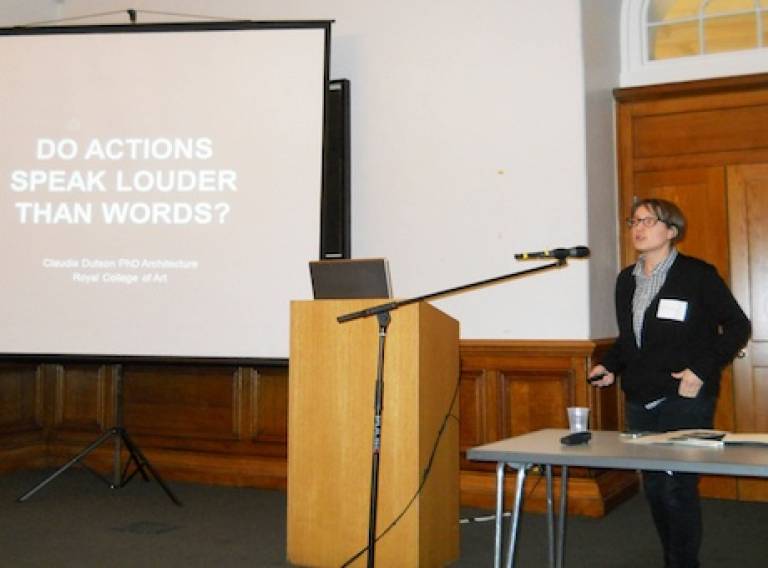LoLo students organise inaugural conference, 'Saving energy in buildings: why does context matter?'
25 November 2013

The London Loughborough (LoLo) Centre for Doctoral Training (CDT) in Energy Demand held its inaugural student conference on 22nd November 2013, bringing together research students across the UK to discuss "Saving energy in buildings: why does context matter?"
This blog was written by Pamela Fennell, MRes student at the LoLo CDT (UCL).
Professor Kevin Lomas from Loughborough University opened the conference and gave an overview from what is happening at an international level through to regional research as well as urban and building level to the building users.
Professor Mike Davies (UCL) announced that the LoLo CDT had successfully secured continued funding from the EPSRC, enabling the CDT to offer another 60 studentships over the next 8 years. The LoLo CDT is a partnership between the UCL Energy Institute and Loughborough University.
Dr. Jez Wingfield was the first speaker, drawing on long experience in research and in industry to demonstrate the performance gap between predicted and actual building performance. With a wide range of illustrative examples, he demonstrated how time and time again, the industry is missing performance standards, a topic regularly returned to in later talks and discussions. He concluded with a proposal for 3 pillars of performance to address the issue:
· Confidence based design: Incentive factors to drive improved control and tolerance factors to make design more realistic
· Process control: National accreditation to recognise high levels of process control and quality assurance in design, construction and the supply chain
· Performance measurement: Output based independent testing to verify performance and (im)prove process
The next talk by Jenny Love (UCL Energy Institute) was a contrast with Dr. Wingfield’s empirical results as it focused on exploratory modeling work, investigating the relationship between the standard of retrofit undertaken (deep or shallow) and the impact of occupant behavior on actual energy use. Jenny memorably characterised the space she was discussing as a ‘slice of cheese’ and demonstrated that neither retrofit nor changes in heating behaviour told the whole story and that the context was very important. She stressed the variability in outcomes and that the more shallow the retrofit, the greater the impact of occupant behaviour, and increased potential for ‘rebound’ or increased energy consumption.
This was followed by a talk about a study many of the audience found out they’d been part of: Paula Morgenstern (UCL Energy Institute) explained how WIFI connections at the UCL energy institute’s building, Central House, had been explored as a proxy for building occupants. The correlation between the occupancy numbers (based on WIFI use) and the electricity usage indicated some areas where energy usage could potentially be reduced, though some users are not connected to WIFI, such as cleaners, and this issue should not be ignored.
A very different aspect of reducing energy demand was discussed by Heinke Thies from the University of Exeter. Heinke’s work examines how the development of eco- skills can support the low-carbon transition. Her work is focused on the case of the Cornish construction industry and highlighted how the local construction industry has failed to identify skills needed for a low carbon transition.
Peter Warren’s work at the UCL Energy Institute had the broadest scale of all the discussions, looking at international best practice in the development of policies for saving energy in buildings, particularly Demand Side Management (DSM). Peter is using a systematic review to explore the issue and recently returned from Washington where he conducted interviews, which highlighted the importance of context, often at a state level. He has produced two short films which you can view here:
Claudia Dutson’s work at the Royal College of Art was particularly novel to those of us used to exploring energy demand through modeling or empirical testing of buildings. She is using speech act theory and scripting to understand how people interact with their environments. She highlighted that when we need to interrogate the terms we use when referring to occupant behavior: it is about us, not some anonymous others. Claudia is currently in the process of preparing the script for the performance piece which is how she is presenting her thesis.
Michelle Shipworth from the UCL Energy Institute continued the theme of human interaction with the built environment exploring all the aspects of energy use in the home in which the human element is important but often overlooked. Using “where’s Wally” she looked at how important individuals are in often unexpected ways, drawing out the invisible people affecting energy use in buildings, which are not just the people living in it, but include for example the plumber, fashion, stores trying to sell us stuff etc. .
The individual experience was also vitally important in Gloria Vargas’s work at the University of Sheffield. She is researching how lobby spaces could be considered as part of an individual’s thermal history and so an influence on perceptions of thermal comfort after passing through the transitional space.
The final two talks were by Esfand Burman (UCL) and Julie Futcher from University College Dublin. Esfand is exploring the performance gap between the predicted and actual energy performance of a number of case study schools. His findings related closely to Dr. Wingfield’s discussion and emphasised how the setting of an overly ambitious consumption target might adversely affect the actual outcomes. Julie Futcher’s work looks at the impact of buildings on their surroundings. Her discussion of how the urban grain could be considered as an environmental modifier was particularly interesting.
Most of the talks at the conference presented “work in progress” which meant the conference had a particularly collaborative feel: in many cases, the questions and answers were as interesting and informative as the talks themselves, due to the exchange of ideas that was taking place.
Alongside the presentations ran 2 poster sessions, showcasing an even wider range of work on energy demand.
Speaker presentations will be uploaded in due course. Conference booklet can be downloaded here.
 Close
Close

